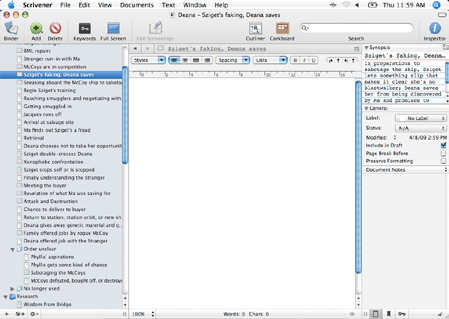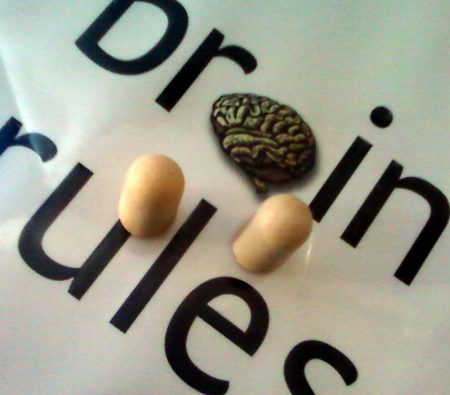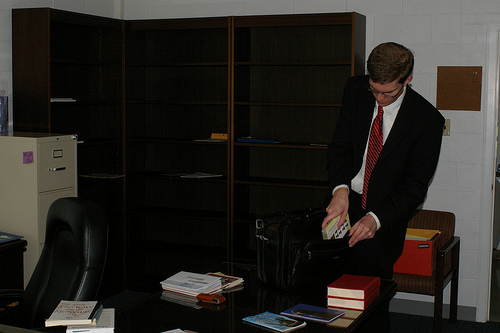
Most of the articles on The Willpower Engine have to do with our mental state and not with outside things like rewards and assistance. There’s a good reason for this: in research, intrinsic motivation (motivation that comes from within ourselves) shows itself to be much more powerful than extrinsic motivation (anything that happens outside us) time and again. Carrots and sticks are nothing compared to ideas and desires.
But there are some ways we can change our environment that in turn make a big difference in our mental state, namely by setting things up invitingly. In this article I’ll talk about one specific tool (Scrivener) for one specific kind of goal (writing), but if you’re interested in how tools and environment change things, read on.
Scrivener is Macintosh-only (later edit: no longer Mac only! A Windows edition is now available) software for writing novels, non-fiction books, screenplays, and other large projects–I’m using it to write the Willpower Engine book, for example. It allows you to organize and switch around among a lot of different pieces of the same project; to add, delete, and move around these pieces; and to store research information (including pictures, videos, notes, Web pages, and so on).

So what’s so great about that? Well, nothing earth-shaking, but when you’re working on a writing project with lots of pieces–whether those pieces are chase scenes, eras of Roman history, or moments that change a character’s view of the world–one of the biggest problems is focusing on each piece intensely as you write it while still being able to keep the whole project in mind. I can be in the middle of writing a chapter when I think of something I need to include in a later chapter. Using Scrivener, I can click on the document that has the outline for that later chapter, stick in the the thought, and be back to writing within 10 seconds.
Before Scrivener, in order to prevent getting off track or distracted, those kinds of notes would tend to end up in a big document that would eventually have to be organized and re-organized, requiring me to write some, organize some, update my outline, and then go back to writing again. In a normal word processor, I have to impose organization. In Scrivener, organization is the whole idea, and in the normal course of using the program I automatically put things in their places.
It’s only a few clicks and a few seconds easier and faster than doing the same kind of thing with a couple of folders full of files, but because it’s so easy to do things in an organized way in Scrivener, I do much more more of it there than I would in any other context. This means that almost all of my time and attention when I use Scrivener is focused on what I’m writing or planning out at that moment, and it also means that as I finish one thing, the next thing to do is often sitting there, ready for me to plunge into it without having to go back and figure out where I’m going next.
If you’ve read many of my other posts, you might begin to recognize these pieces as being the kind of things that help a person get into a state of flow. Flow, briefly, is a state in which you’re highly focused on a task, working enthusiastically at your highest level of skill, to the point where the time just seems to fly by while you get things done. As you can imagine or may know from experience, it’s both very productive and a ton of fun.
I don’t mean this article to be an advertisement for Scrivener (although it’s a great tool, and I recommend it for writers who have Macs), but when we look at how for some writers using this program instead of even a very good word processor affects getting things done, it’s clear that the right tools can do a lot to create a productive and enthusiastic mental state.
Later addition – If you do happen to be interested in Scrivener, you can get 20%-50% off with this offer. There’s a 30-day free trial available on the Scrivener site.
So what kinds of tools help make work inviting, improve focus, and boost productivity? Search out tools that
- keep your work organized with little or no effort, like tool trays for graphic artists
- let you break your work up into smaller pieces, like a long workbench that offers room for a series of components to be spread out
- are attractive or appealing, like a comfortable pen that makes a good line
- work smoothly and effectively all the time, like a top-notch pair of hair cutting scissors
- keep your tools or components in front of you (rather than hiding things you might need to remember or find), like pegboard
- are intuitive, like an iPod
In Wednesday’s article, I’ll turn the discussion to work environment itself and what kinds of changes we can make to turn a space where we’re trying to get something done into a space that actually helps us get things done–and make the process more enjoyable. And I’m curious about tools that you’ve found help motivate you. What’s the most exceptional tool you own?
Multitool photo by 2:19











